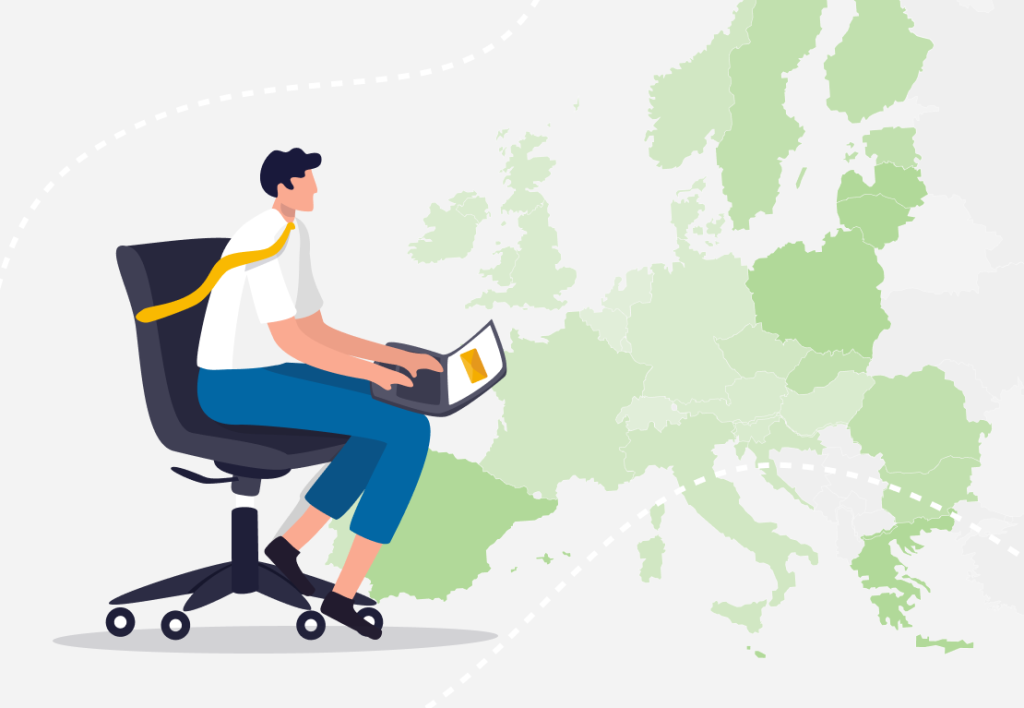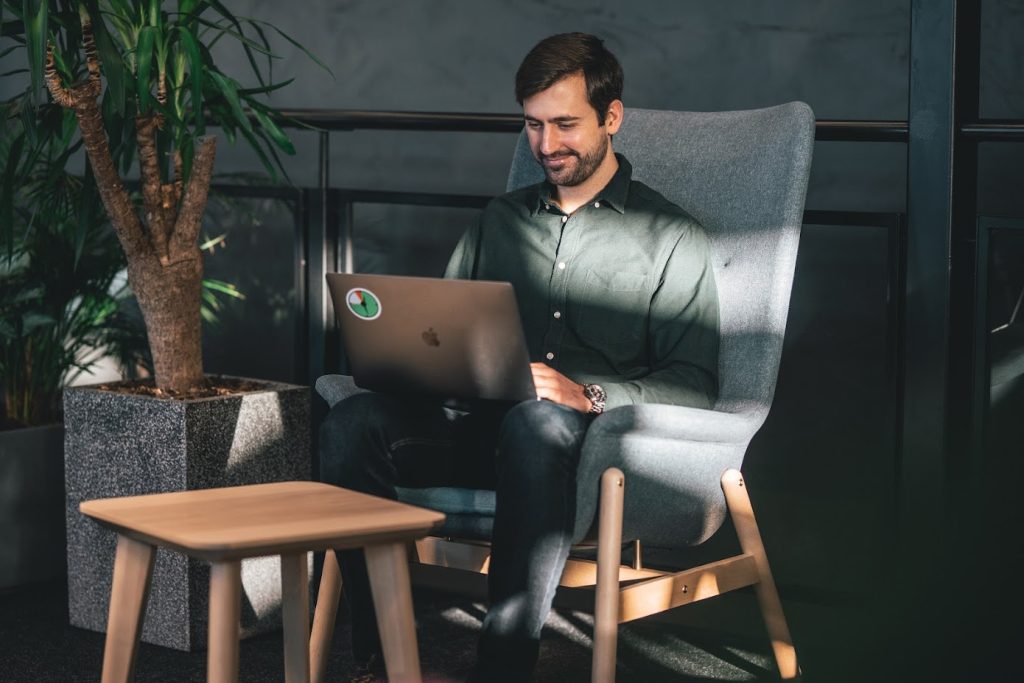Email habits of European workers in 2022

At DeskTime, we are passionate about data analysis, and today we will be focusing on the email usage trends of our European users in 2022. This is a hotly debated topic, with some experts claiming that emails can be a major time drain and negatively impact productivity.
We will see whether this reputation is warranted – we have collected email usage data from DeskTime software users in 30 European countries, and we will analyze the amount of time our users spend on emails and compare usage across different countries.
Want to get the most out of your time?
Try DeskTime for free!
Try free for 14 days · No credit card required.
By signing up, you agree to our terms and privacy policy.

Main takeaways
- According to data collected by DeskTime, European users spent an average of 18 minutes per day on emails
- Malta had the highest average usage, with users spending 55 minutes per day on emails, followed by Spain (38 minutes) and Greece (36 minutes)
- Luxembourg, Austria, and Switzerland had the lowest average usage, with only a few minutes per day spent on emails
- The average European worker spends 6.8% of their work time on emails
- These results suggest that the perception of emails as a significant time drain may not be entirely accurate
- The relatively low email usage in the current remote and hybrid work environment suggests that users may be turning to alternative forms of communication, such as instant messaging apps
Methodology and data
DeskTime conducted a study in November 2022 to examine email usage among its productivity software users from 30 European countries. The study included over 11,000 participants, mostly knowledge workers who primarily use computers during work hours. By collecting data on the monthly time spent on email per country, DeskTime calculated the daily average email usage per person for each country:
| # | Country | Time on emails per day per person (min) | Emails as a % of total work time |
| 1 | Malta | 55.02 | 15.99% |
| 2 | Spain | 38.35 | 14.12% |
| 3 | Greece | 36.82 | 10.95% |
| 4 | Latvia | 36.30 | 11.12% |
| 5 | Poland | 30.99 | 9.80% |
| 6 | Lithuania | 30.75 | 14.47% |
| 7 | Sweden | 29.89 | 8.91% |
| 8 | Romania | 28.50 | 9.58% |
| 9 | Slovakia | 26.43 | 9.13% |
| 10 | Finland | 25.93 | 9.57% |
| 11 | Estonia | 24.77 | 8.57% |
| 12 | Bulgaria | 22.88 | 8.03% |
| 13 | Italy | 18.43 | 7.97% |
| 14 | Portugal | 14.28 | 5.44% |
| 15 | Croatia | 13.98 | 5.20% |
| 16 | France | 13.16 | 5.28% |
| 17 | Norway | 11.96 | 7.26% |
| 18 | Czech Republic | 11.44 | 2.81% |
| 19 | Hungary | 10.62 | 3.31% |
| 20 | Ireland | 10.32 | 3.92% |
| 21 | Slovenia | 10.15 | 10.11% |
| 22 | Denmark | 9.90 | 2.93% |
| 23 | Germany | 9.34 | 3.82% |
| 24 | UK | 7.35 | 2.80% |
| 25 | Netherlands | 6.12 | 2.47% |
| 26 | Cyprus | 4.81 | 2.23% |
| 27 | Belgium | 4.25 | 1.81% |
| 28 | Switzerland | 4.10 | 3.25% |
| 29 | Austria | 3.68 | 2.35% |
| 30 | Luxembourg | 2.11 | 0.71% |
According to DeskTime’s data, email usage among employees is higher in Southern Europe compared to Western Europe, where Benelux countries have particularly low usage. Perhaps this disparity can be explained by differences in business communication style and etiquette between these European regions.
Is email usage decreasing and becoming more efficient?
The data certainly challenges the notion of emails as a significant time sink. This might seem counterintuitive given that the shift to remote and hybrid work due to the COVID-19 pandemic has increased the need for digital communication. However, one explanation could be the growing popularity of instant messaging apps like Slack and Microsoft Teams.
The shift towards instant messaging apps is likely motivated by the need for streamlined communication. Compared to email, these platforms offer a more efficient way for workers to communicate with their colleagues for quick questions and answers.
The data may also indicate a growing awareness of the importance of reducing and optimizing email usage to increase productivity. Experts have been advocating for strategies such as the “inbox zero” approach and triaging incoming mail for years, and it’s possible that these efforts are finally bearing fruit.

Can productivity software change the way we use email?
Another important aspect to consider is that the data was collected from users who were utilizing DeskTime productivity software. These organizations and individuals may be more productivity-conscious, which could result in less time being spent on emails.
It’s not a secret that managing emails can be challenging – that’s why they have acquired such a notorious reputation. It’s easy to get lost in the constant flow of messages, and some people may not be aware of the extent of time they spend on emails. The point is – without data, it can be difficult to identify the problem in the first place.
Productivity software can provide a clearer picture of this by providing analytics on email usage. With the relevant data, organizations can determine whether they need to take steps to reduce the time spent on email management – for example, by introducing better communication guidelines or alternative forms of communication.

Looking for ways to up your business?
Use DeskTime for time management, and always stay on top of your team’s efficiency ratings!
Conclusion
According to DeskTime, European users spend an average of 18 minutes per day on emails, which equates to 6.8% of their work time on average.
There are significant variations between countries, with usage ranging from nearly an hour in Malta to only 2 minutes in Luxembourg. Despite these disparities, overall email usage among DeskTime users can be considered relatively low.
This data counters the commonly held belief that emails are a significant time drain. However, it’s important to consider the limitations of this survey, as it only includes DeskTime European users who are predominantly knowledge workers. Nevertheless, data on email usage is scarce, and this survey provides valuable insights into workplace trends.
Did you find this article useful? Give it a clap!
Psst! You can clap more than once if you really loved it 🙂